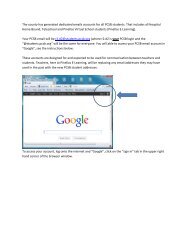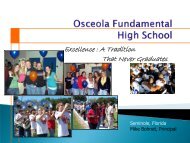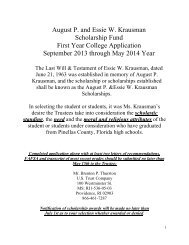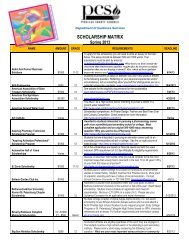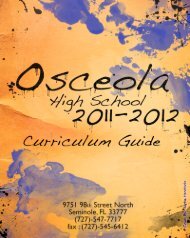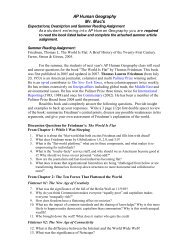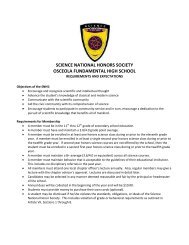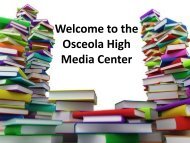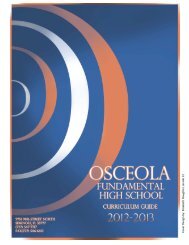Florida US History End-of-Course Assessment Test Item Specifications
Florida US History End-of-Course Assessment Test Item Specifications
Florida US History End-of-Course Assessment Test Item Specifications
- No tags were found...
You also want an ePaper? Increase the reach of your titles
YUMPU automatically turns print PDFs into web optimized ePapers that Google loves.
Content Limit<br />
Stimulus Attribute<br />
Content Focus<br />
<strong>Item</strong>s addressing issues <strong>of</strong> civil rights should be limited to the<br />
Roaring Twenties and the Great Depression (1919–39).<br />
<strong>Item</strong>s addressing social, political, and economic conditions in the<br />
United States during the 1920s and 1930s use historical documents<br />
and other relevant stimuli (e.g., maps, timelines, charts, graphs,<br />
tables).<br />
These terms are given in addition to those found in the standards,<br />
benchmarks, and benchmark clarifications. Additional items may<br />
include, but are not limited to, the following: Booker T. Washington,<br />
Eighteenth Amendment, flappers, Fundamentalist Movement, Great<br />
Migration, Harlem Renaissance, Ku Klux Klan, Marcus Garvey,<br />
nativism, National Association for the Advancement <strong>of</strong> Colored<br />
People (NAACP), Nineteenth Amendment, normalcy, Prohibition,<br />
quota system, Rosewood Incident, Sacco and Vanzetti, Seminole<br />
Indians, Universal Negro Improvement Association, Volstead Act,<br />
W.E.B. DuBois.<br />
100000394612<br />
Sample <strong>Item</strong> 8 SS.912.A.5.10 Content Focus Harlem Renaissance<br />
The excerpt below was written by Langston Hughes in 1926.<br />
One <strong>of</strong> the most promising <strong>of</strong> the young Negro poets said to me once, “I want<br />
to be a poet—not a Negro poet”. . . And I was sorry the young man said that, for<br />
no great poet has ever been afraid <strong>of</strong> being himself. And I doubted then that,<br />
with his desire to run away spiritually from his race, this boy would ever be a<br />
great poet.<br />
Source: Public Domain / The Nation<br />
Based on the excerpt, what advice would Langston Hughes have given to young African<br />
Americans during the Harlem Renaissance<br />
A. He would have challenged them to further their literary training.<br />
B. He would have encouraged them to celebrate their racial identity.<br />
C. He would have suggested that they shape a tradition <strong>of</strong> passive resistance.<br />
D. He would have recommended that they promote a tradition <strong>of</strong> racial tolerance.



